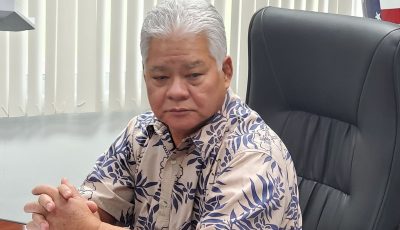Blanco-Maratita sacked, after board is stacked against her
The Tinian Casino Gaming Control Commission voted last Tuesday to dismiss executive director Lucy Blanco-Maratita and terminate her employment contract on the same day, with a vote of 4 to 1 in favor of her removal.
The move comes over a month after Superior Court Associate Judge David A. Wiseman disagreed with the commission’s position that a commissioner’s term runs from the date of his or her confirmation, as opposed to staggered fix-date terms. The ruling meant that Tinian Mayor Joey San Nicolas’ position in June that several members of the commission “would cease to set on the commission and shall not be included in the quorum count” because of conflicts between staggered term cycles set by law would follow through.
The Tinian municipality had argued that each of the commissioner’s term should run from March 30, 1990, the date of appointment for the first set of commissioners, under a formal staggering scheme, even as one ex-commissioner, Bernadita Palacios, had been serving for more than five years by June last year.
On Tuesday, vice chairman Jose P. Kiyoshi made the motion to terminate Blanco-Maratita’s contract. Kiyoshi is a former CEO of the Tinian Mayor’s Office, who came on board the commission on or about Dec. 14 2015. Commissioners Charlene M. Lizama—a former Tinian Municipal treasurer who was appointed to the commission by mayor San Nicolas over two weeks ago—Patrick San Nicolas, and commissioner chair Esther Barr voted yes. Commissioner Lydia Barcinas voted no.
The commission also voted to terminate the legal services contract of the law firm of Bob O’Connor.
Under the Gaming Act, the executive director and the deputy director may be dismissed with or without cause.
“The commission did not give a reason for the dismissal,” Blanco-Maratita told Saipan Tribune in an email. “An evaluation of my performance was not conducted prior to the action and none of the commissioners informed me or met with me to discuss that they were displeased with my performance.”
Messages left to Barr and Kiyoshi at the commission’s office last week were not immediately returned as of press time.
“It has been public knowledge that Tinian’s elected leaders were after my removal,” she said. “The removal is not surprising.”
Blanco-Maratita’s contract was set for the commission’s agenda on a Jan. 13 meeting but that was recessed until last Tuesday.
During that meeting, Blanco-Maratita submitted a statement in hopes to clarify “a general misunderstanding of the role of the commission,” in light of blame they taken for the closure of Tinian Dynasty Hotel & Casino, the lack of revenue stream, and the lack of local budget and money to pay for government jobs.
“That is not correct,” Maratita said. “The job of the…commission is to ‘control casino gaming.’”
She recalled the first month she was hired on May 2013; some 10 days after federal agents raided the Tinian Dynasty in late April, calling this a “turning point” for the industry.
“It was a wake-up call,” she said, “that the regulation of our casino industry can no longer be ‘business as usual’ on Tinian.”
From that time, she said the commission sough to obtain consultant and investigative resources to enforce a compliant and properly licensed industry, and vet services doing business with the casino.
“When I set out to execute those instructions of the commission, the Dynasty complained and insisted that we should not make it hard on them,” she said in her prepared statement to the commission.
Blanco-Maratita notes the “most important” initiative she and the commission undertook was the clean up of deduction of junket play commission and rebates from gross gaming revenue. These deductions violated the local Gaming Act and were terminated, she said, to much resistance from the casino and local politicians. “So much so that the tax structure was amended to lower the gaming tax from essentially 12 percent to 5 percent for high rollers,” she added.
She also defended the delays in casino applicant processing. “When applicants and operators insist they do not have to follow the law…when they refuse to submit or not respond to document request or do not fully respond (especially where financial documents and source of funds are concerned,) they delay the process.
“…It is not enough that an investor come to Tinian with bags of money, millions of dollars,” she said.



























